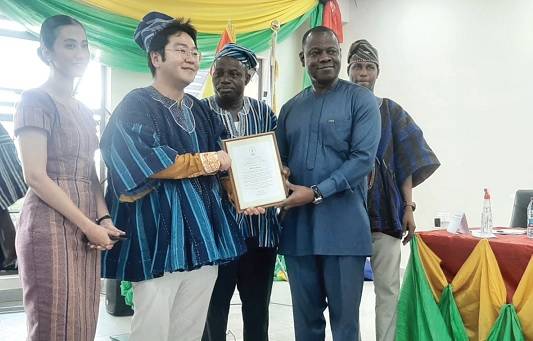Empowering Healthcare in Ghana: The CHPS+ Phase II Initiative
Ghana's healthcare system is set to receive a significant boost with the launch of the CHPS+ Phase II initiative, a $12 million project aimed at strengthening the Community-based Health Planning Services (CHPS) zones, health centers, and district hospitals. The five-year project, a collaboration between the Ghana Health Service (GHS) and the Korea International Cooperation Agency (KOICA), seeks to equip healthcare facilities with essential medical equipment and enhance the capacity of health workers, ultimately leading to improved health outcomes.
Background and Success of CHPS+ Phase I
Building on the success of the first phase of the project, which saw a $9 million investment in the Upper East Region from 2016 to 2021, the CHPS+ initiative made significant strides in reducing institutional maternal mortality ratio and under-five mortality ratio by more than 50% in the region. These encouraging outcomes have set the stage for the second phase, which promises even greater positive impacts on healthcare delivery.
The Scope of CHPS+ Phase II
The CHPS+ Phase II initiative will be implemented in 15 districts in the Upper East Region and seven districts in the North East Region. Its comprehensive approach includes the construction of new CHPS compounds and health centers in rural communities, ensuring that even the most remote areas have access to essential healthcare services. Moreover, it seeks to support the daily operations of community health officers (CHOs) by providing them with motorbikes, enabling more efficient outreach services to reach vulnerable populations.
Efforts will also be made to widen the coverage of community tricycle ambulances, crucial for transporting patients with critical cases to nearby health facilities. The project recognizes the significance of CHPS in bringing healthcare delivery to the doorstep of the people, making it a symbol of hope for better health in the regions.
Government Commitment and Support
The launch of the CHPS+ Phase II initiative signifies the government's unwavering commitment to ensuring equitable access to healthcare for all Ghanaians. Dr. Abdulai Abukari, the North East Regional Director of Health Services, emphasizes that the project underscores the government's dedication to prioritizing the health needs of its communities, making their well-being a top priority.
Stakeholder Engagement and Preparedness
In preparation for the project's implementation, the Ghana Health Service (GHS) has already engaged stakeholders in life-saving skill workshops for core regional resource teams. Additionally, funds have been disbursed to beneficiary districts to support outreach programs. Dr. Patrick Kuma-Aboagye, the Director-General of GHS, expressed his gratitude to the government of Korea for their support and reaffirmed the organization's commitment to ensuring the success of the initiative.
KOICA's Pledge of Support
KOICA's Country Director, Seungmin Oh, reassured the GHS of the agency's unwavering support. He pledged to provide technical and financial assistance to enhance healthcare delivery in Ghana. The project's key areas of focus include enhancing community engagement, improving maternal, newborn, and child health services, and strengthening the overall health system environment
The CHPS+ Phase II initiative stands as a testament to the joint commitment of Ghana and KOICA in their pursuit of Universal Health Coverage (UHC). By enhancing community-based healthcare services, improving maternal and child health, and strengthening the overall health system, the project aims to create a healthier and more resilient nation.
Enhancing Community Engagement
Community engagement plays a pivotal role in successful healthcare initiatives. The CHPS+ Phase II project recognizes this by involving local communities in the planning and implementation of healthcare programs. By fostering a sense of ownership and participation, the initiative ensures that healthcare services meet the specific needs and cultural sensitivities of each region.
Through active community involvement, the project strives to promote health-seeking behaviors and raise awareness about preventive healthcare measures. Community members will be encouraged to take charge of their health, leading to a more sustainable healthcare system in the long run.
Improving Maternal, Newborn, and Child Health
Maternal and child health is a critical aspect of any comprehensive healthcare strategy. The CHPS+ Phase II initiative places a strong emphasis on improving maternal and child health outcomes in both the Upper East and North East Regions.
One of the key objectives is to reduce maternal mortality rates, ensuring that mothers have access to quality antenatal and postnatal care. By providing healthcare facilities with the necessary equipment and skilled health workers, the initiative aims to improve safe delivery practices and emergency obstetric care.
Moreover, the project strives to enhance child health services, reducing under-five mortality rates through immunization programs, nutritional support, and early diagnosis and treatment of childhood illnesses. By ensuring the well-being of mothers and children, Ghana can secure a healthier and more prosperous future for its next generation.
Strengthening the Overall Health System
A robust health system is the backbone of any successful healthcare initiative. The CHPS+ Phase II project recognizes this, and therefore, seeks to strengthen the health system at various levels.
The construction of new CHPS compounds and health centers in rural communities addresses the issue of healthcare accessibility. By bringing healthcare closer to the people, especially in remote areas, the project eliminates geographical barriers and increases healthcare utilization.
Supporting community health officers (CHOs) with motorbikes further boosts the effectiveness of outreach services. CHOs can now reach even the most isolated communities, providing medical care and health education where it is needed the most.
Widening the coverage of community tricycle ambulances demonstrates the project's commitment to emergency response services. This initiative ensures that patients with critical cases can receive timely medical attention, reducing the risk of preventable deaths.
A Collaboration of Hope
The CHPS+ Phase II initiative is a testament to the power of collaboration. The partnership between the Ghana Health Service and KOICA exemplifies how international cooperation can drive positive change in the lives of people. The project combines expertise, resources, and commitment to create a transformative impact on Ghana's healthcare landscape.
As the project progresses, it is essential to maintain strong communication and coordination among all stakeholders involved. Regular monitoring and evaluation will provide valuable insights into the project's effectiveness, enabling necessary adjustments to be made promptly.
Conclusion
The CHPS+ Phase II initiative represents a bold step towards achieving Universal Health Coverage in Ghana. Through the concerted efforts of the Ghana Health Service and KOICA, the project aims to equip healthcare facilities, empower health workers, and elevate community engagement to new heights.
By addressing the specific needs of the Upper East and North East Regions, the initiative brings hope to underserved communities, promising a healthier and more prosperous future for all Ghanaians.
As the five-year journey unfolds, the impact of CHPS+ Phase II will be closely watched. It is hoped that the project's success will serve as an inspiration for other nations, demonstrating the significance of collaborative efforts in advancing healthcare and ultimately contributing to a healthier world for all.



No comments yet
Be the first to share your thoughts!